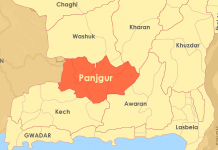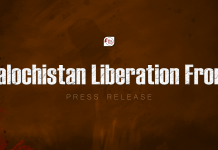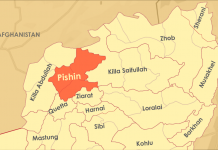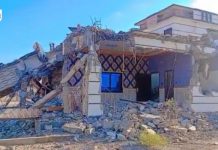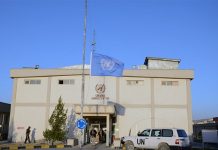Author : Shayaan Baloch
Whenever a colonizer wishes to occupy a nation and its land, they have historically employed various methods, including military invasion (which is fundamental and necessary for colonization), economic, political, and cultural exploitation, as well as psychological warfare to sustain their occupation.
In line with this principle of colonization, Pakistan has consistently engaged in a psychological war, primarily through instilling fear, against the Baloch people. This fear has manifested in enforced disappearances, dumping of mutilated bodies, and attacks on Baloch masses through the use of firearms, machine guns, and mortars, among other practices.
Chaghi has suffered greatly from a massive attack by the occupying Pakistan in the form of an atom bomb. On May 28, 1998, Pakistan callously subjected us to an atom bomb attack to establish intimidation among us.
The Raaskoh mountains of Chaghi were rich in minerals, and the region was also agriculturally fertile. However, this attack deprived our region of its mineral resources.
Moreover, not only were the resources taken away from the indigenous people, but they were also inflicted with a lethal disease—cancer—as a result of the aftermath of the nuclear explosion. Every year, numerous individuals, including children, succumb to the toxic impacts of this disease.
While Pakistan justifies its actions by claiming it was in response to India’s atomic power, Chaghi has been burdened with the lethal legacy of cancer. On one hand, Pakistan boasts, “I am the only Islamic nuclear power in the world, standing with power,” but on the other hand, Chaghi in Balochistan cries out for a cancer hospital to treat the victims suffering from the aftermath of this nuclear disaster.
Allow me to add that if it was necessary for Pakistan to respond to India, there were many other places where tests and demonstrations could have been conducted. Why Chaghi?
Chaghi, located in Balochistan, is home to world-famous projects like Reko Diq and Saindak, known for their discoveries of gold, silver, and other valuable minerals. However, its people are dying due to inadequate access to clean drinking water, the unavailability of arable land for agricultural production, and the absence of a single cancer hospital or opportunities for treatment outside Balochistan.
Chaghi was once a densely populated region that was severely impacted by this lethal weapon, with its toxic effects still engulfing the Baloch masses to this day.
Due to the loss of lives in Balochistan resulting from the tragic event on May 28, 1998, we commemorate this day as Aas-Rokh in Balochistan. It is important to note that during this time, the nationalist party BNP-Mengal was in power, with Akhtar Mengal serving as the so-called Chief Minister of Balochistan. While he has been accused of being complicit in the actions of the then Prime Minister of Pakistan, he claims that no one sought his consent or involvement in carrying out the atomic power attack in Chaghi.
Regardless, Chaghi Balochistan continues to suffer from the aftermath, and none of the so-called nationalist parties have fully recognized the extent of the losses.
BSO-AZAD, BNM, and FBM have been observed to be active in addressing this issue, while the others have not taken significant action.
Disclaimer: The views and opinions expressed in this article are those of the author and do not necessarily reflect the official policy or position of The Balochistan Post or any of its editors.











